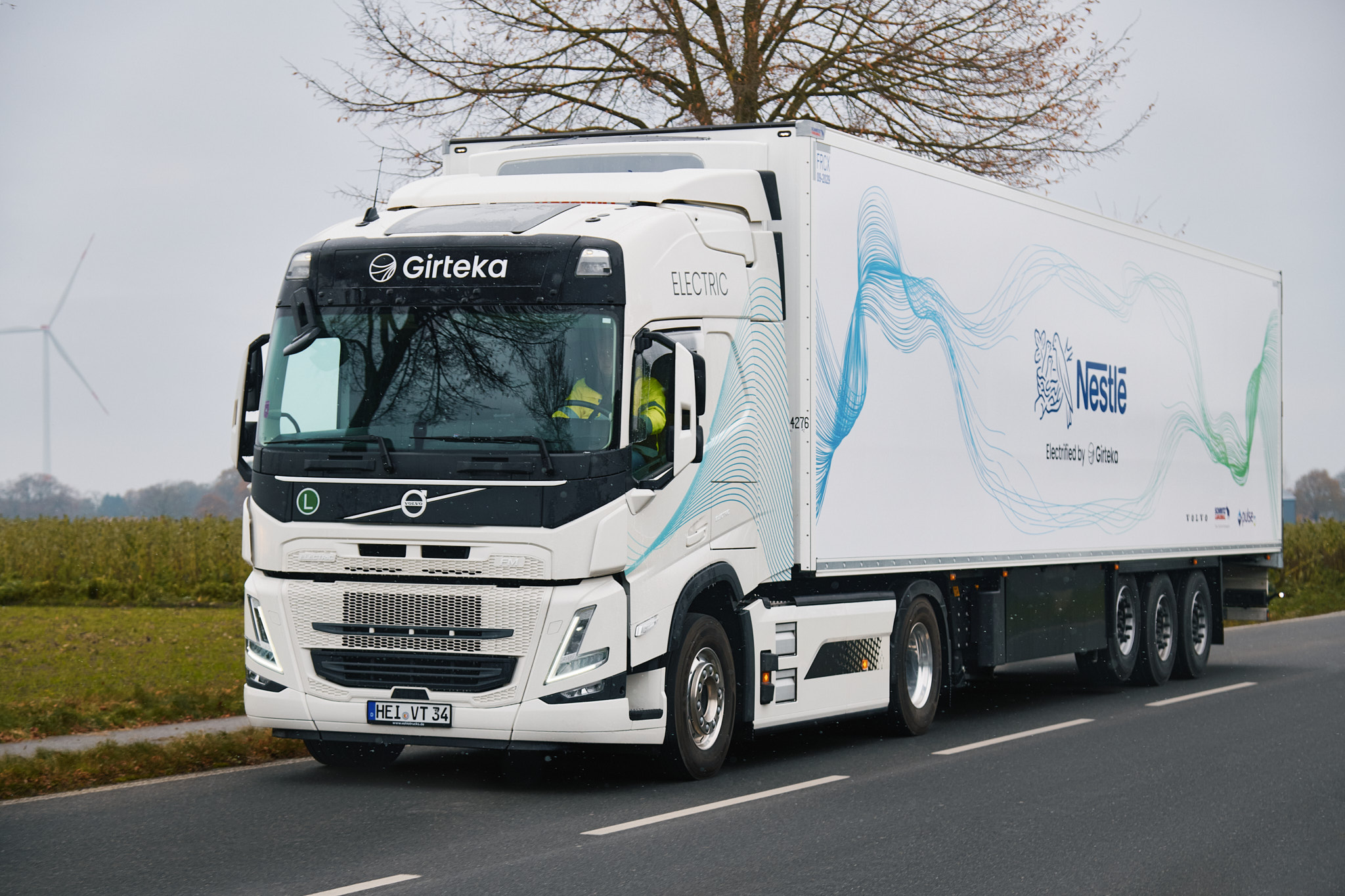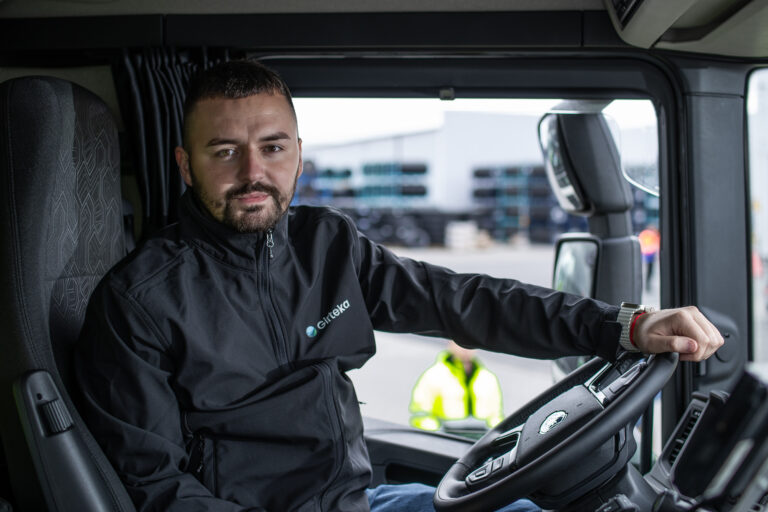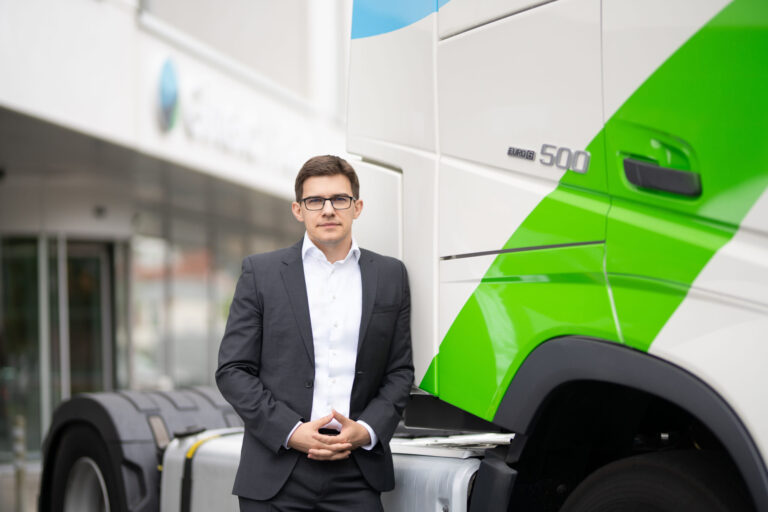Share it:
As climate change drives the global push for sustainability, the logistics sector is at the forefront of this transformation. Transportation accounts for approximately 25% of global emissions, with a significant portion from road transport. In response to this, Girteka has put a strong emphasis on promoting sustainable transport solutions – particularly Battery-Electric Vehicles (BEVs) – as one of the future-proof solutions to ambitious industry players.
This initiative aligns with the European Union’s goal of becoming the first climate-neutral continent by 2050 and supports the European Green Deal’s aim to decarbonize road transport. With many European cities planning to establish zero-emission zones, the shift towards electric vehicles is becoming essential. Therefore Volvo, Schmitz Cargobull, BP Pulse and Girteka have taken the initiative to test the first fully electric truck and trailer. What are the results?
Collaborative Testing for BEV Integration
The discussion on the utilization of electric trucks in logistics operations continues. Many companies are already conducting trials, trying to find a common understanding and solution that will combine customer needs, manufacturers’ possibilities, infrastructure capabilities and availability. It comes down to logistics companies like Girteka to conduct trial runs and involve all relevant stakeholders in the process.
To explore the potential and challenges of integrating BEVs into logistics, Girteka, together with Volvo, Schmitz Cargobull, and BP Pulse, has entered the testing phase and conducted a comprehensive several-day trial including a Volvo FM Electric truck with a fully electric Schmitz Cargobull S.KOe COOL box semi-trailer.
The trial assessed the vehicles’ performance, energy efficiency, and reliability. Over the course of the trial, the electric truck and trailer unit successfully completed multiple round trips for Girteka’s client Nestlé, covering a total distance of approximately 1,500 kilometers. The truck operated under varying load conditions, including refrigerated goods, demonstrating consistent performance and reliability.
The all-electric S.CUe transport cooling unit was used in combination with a battery pack and the Schmitz Cargobull generator axle. The cooling unit has optimized temperature control, specifically designed for transporting sensitive goods. It is rechargeable while driving or breaking with the ScB generator axle and on-board 22 kW charger. The battery can be charged in parallel with network operation.
Volvo FM Electric
| Engine | 2-3 electric motors up to 666 HP |
| Power Output | 490 kW continuous |
| Transmission | I-Shift gearbox adapted for electromobility |
| Battery Capacity | 549 kWh |
| Range | Up to 300 km |
| Charging time | 0% to 100% in 2 hours |
Schmitz CargoBull
| Cooling Capacity | 15.800 watt |
| Heating Capacity | 10.500 watt |
| Control Unit Supply | 400 V AC, 32 A, 50 Hz |
| HV Battery Capacity | 32 kWh |
| Voltage | 530V – 660 V DC |
| Autonomous Runtime | > 5h |
| E-axis Power | 20 kW, recuperation |
| Charging Time | 2h at 400 V |
Evaluating the Results of the Trial
This pilot project showcased not only the technical viability but also the operational efficiency of electric transport solutions in real-life scenarios. According to the performance report, this electric setup demonstrated impressive energy efficiency, with the truck consuming an average of 1.35 kWh per kilometer. The integration of BP pulse’s high-power charging infrastructure ensured minimal downtime, with each charging session averaging 1.5 hours.
One of the core features designed for smooth integration of the trailer into the existing infrastructure is the CEE charging socket, which allows for efficient and convenient recharging. Additionally, the electric drive’s PIEK-certified silence kit enables quiet day and night deliveries even in residential areas, ensuring minimal disruption and enhancing operational flexibility.
This test is a one-off with this line-up, but due to the success of it, Girteka is working on similar test projects and implementation of the results in daily operations. Looking at the broader picture, the outcome of this trial not only highlights the significant potential of BEVs to revolutionize the industry, but also showcases the importance of collaboration in addressing the business, logistical, and technological challenges posed by the pressing need to decarbonize the transport sector.
“Open dialogue is fundamental in this collaboration. It ensures that all parties, from manufacturers of goods to automotive and trucking companies like Volvo, and from a trailer manufacturing expert like Schmitz Cargobull to energy specialists like BP Pulse and logistics providers are on the same page,” notes Viktorija Terekė, Head of Sustainability at Girteka.



